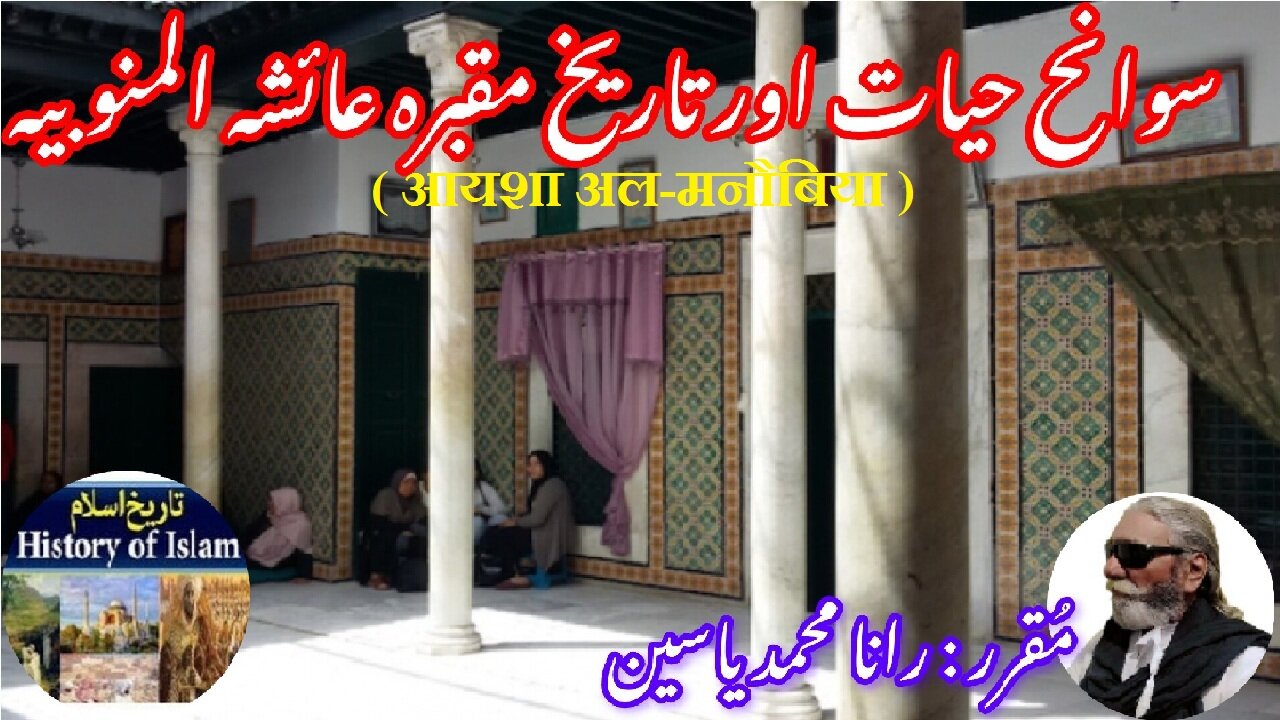Premium Only Content

Aisha Al-Manoubya आयशा अल-मनौबिया عائشہ المنوبیہ کی سوانح حیات اور ان کے مزار کی تاریخ
@islamichistory813 #sufisaint #aisha #almanoubya #culturalheritage #biography #islamicmysticism #islamicphilosophy #shrine #historicalfigures
Biography of Aisha Al-Manoubya and the history of his shrine
Dekhti Aankhooon aur sountay kaanoon ko Asslamoalaikum, sisters, brothers friends and elders, in informative series videos of Islamic ascolars, sufisaints, cultural heritages, islamic philosophys, islamic mysticisms and historical figures. today we are describing biography of Aisha Al-Manoubya and the history of his shrine.
Aisha Al-Manoubya, also known by the honorific As-Saida ('saint') or Lella ('the Lady') (1199–1267 CE), is one of the most famous women in Tunisian history and a prominent figure in Islam. She is "one of the few [women] to have been granted the title of saint."
Aisha was known for her Sufism and good deeds. She was the supporter and student of Sidi Bousaid al-Baji and Abul Hasan ash-Shadhili. Her activities in higher education, advocacy, and public acts of charity were unusual for her time given her sex.
Dates given for Aisha's life vary slightly, but scholarly sources suggest she lived from 1199 to 1267 CE (595–665 AH).
According to the standard hagiography, Aisha was born in the village of Manouba, near Tunis, and showed signs of her saintliness already in childhood, challenging social norms and effecting miraculous deeds (karamat).
In portraying Aisha's socially-transgressive behavior, narrations of her story tend to "alig[n] her with the sufi model of the 'blamable ones" (ahl al-malama), those who went about transgressing social norms on purpose" (see also: Malamatiyya).
According to a popular narrative, "after her father had slaughtered a bull at her request, she cooked it, distributed its meat to villagers, and brought it back to life in order to reveal her sainthood," an event which was then "regularly commemorated in song during rituals held at her shrines."
Aisha studied in Tunis with Shadhiliyya ?ufis, moving back and forth between her rural home and urban Tunis. Prominent influences were the female mystic Rabia al-Adawiyya al-Qaysiyya Abu l-?assan al-Shadhili, who founded the Shadhili ?ufi order; the Baghdadi Abd al-Qadir al-Jilani, of Baghdad, namesake and patron of the Qadiriyya); and al-Junayd, a Sh?fi?? scholar associated with Baghdad but originally of Persian origin.
Aisha is one of the few women to have been the subject of a written saint's life (manaqib) in the Islamic world of her time, and she "represents a leading figure of women's sainthood in Islam." Whereas it was customary for female saints in her region to be recluses, Aisha mixed with male society, including the poor, Sufi scholars, and even the Hafsid sultan.
She had two shrines dedicated to her, one in La Manouba (destroyed in 2012) and the other in the Gorjani district of Tunis.
In popular memory, Aisha represents a powerful and respected saint. One of the souks of the Medina of Tunis, "Souk Es Sida El Manoubya," was named after her.
The inhabitants of Manouba built a second mausoleum to commemorate Aisha under the name of "The Mausoleum of As-Saida Al-Manoubya" in her birthplace area. The Mausoleum is still famous today and valued in the field of Tunisian national heritage and history. It was vandalised and burned after the Tunisian Revolution on 16 October 2012.
Many books and studies have discussed Aisha's history. So, too, have cinema and Sufi songs and performances. Key scholarly studies of Aisha include:
Amri, Nelly, 'Femmes, sainteté et discours hagiographique au Maghreb médiéval: Naissance à la sainteté, naissance à l'histoire; Le case d'une sainte de Tunis, 'Â'isha al-Mannûbiyya (m. 665/1267)', in Histoire des femmes au Maghreb: Réponses à l'exclusion, ed. by Mohamed Monkachi (Morocco: Faculté des Lettres de Kénitra, 1999), 253–74. Amri, Nelly, Les Femmes soufies ou la passion de Dieu (St-Jean-de-Bray: Dangles, 1992)
Ab? 'Abd al-Ra?m?n al-Sulam?, Early Sufi Women: Dhikr an-Niswa al-Muta'abbidat as-Sufiyyat, trans. by Rkia Cornell (1999)
Katia Boissevain, Sainte parmi les saints. Sayyida Mann?biya ou les recompositions cultuelles dans la Tunisie contemporaine
With this, we seek your permission until tomorrow, tomorrow we will describe the biography of Merkez Efendi and the history of his Shrine. Allah Hafiz.
==================
-
 7:49
7:49
ISLAMIC HISTORY
17 hours agoHow can we ask for forgiveness like the companions ہم صحابہ کی طرح استغفار کیسے کر سکتے ہیں ؟
5 -
 1:13:35
1:13:35
Glenn Greenwald
10 hours agoCharlie Kirk Assassinated; NATO Alleges Russian Drones Flew Over Poland, and More | SYSTEM UPDATE #512
284K289 -
 1:46:28
1:46:28
Badlands Media
23 hours agoAltered State S3 Ep. 45: The Assassination of Charlie Kirk
160K27 -
 8:56:53
8:56:53
Dr Disrespect
16 hours ago🔴LIVE - DR DISRESPECT - THE FINALS - NEW SEASON 8 LAUNCH EVENT W/ THE SHOTTY BOYS
281K10 -
 LIVE
LIVE
RealAmericasVoice
3 days agoHOME OF REAL NEWS
2,943 watching -
 27:00
27:00
BonginoReport
11 hours agoRest In Peace Charlie Kirk - Nightly Scroll w/ Hayley Caronia (Ep.131) - 09/10/2025
261K401 -
 1:20:06
1:20:06
Kim Iversen
11 hours agoRIP Charlie Kirk: When Words Fail, They Reach for Guns
186K337 -
 2:47:04
2:47:04
DDayCobra
12 hours ago $18.29 earnedCharlie Kirk SHOT
159K63 -
 1:14:30
1:14:30
Redacted News
11 hours agoBREAKING! CHARLIE KIRK SHOT BY ASSASSIN IN UTAH, TRUMP CALLS FOR NATIONAL PRAYERS
335K531 -
 3:50:27
3:50:27
Right Side Broadcasting Network
17 hours agoLIVE REPLAY: Latest News from the Trump White House - 9/10/25
380K102